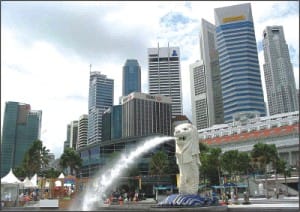Recession looms for S’pore

A view of Singapore city, Southeast Asia’s wealthiest economy. Singapore appears headed for its first recession since 2002 as the city-state suffers from a US economy wilting under its worst financial crisis since the Great Depression.
Singapore appears headed for its first recession since 2002 as the city-state suffers from a US economy wilting under its worst financial crisis since the Great Depression, economists say.
Southeast Asia's wealthiest economy in terms of GDP per capita is heavily dependent on trade, which makes it sensitive to hiccups in developed economies, particularly key export markets the US and Europe.
The crisis that began last year in the US subprime, or higher-risk, mortgage sector is now infecting European shores, and Singapore may very likely find itself in an extended downturn, economists said.
They expect this Friday's release of preliminary economic data for the third quarter to confirm Singapore is in a technical recession, generally defined as two consecutive quarters of quarter-on-quarter contractions in economic output.
"We are pencilling in the worst for Singapore.... We might see two straight years of (economic) contractions (from 2009 to 2010)," said Song Seng Wun, a regional economist with CIMB-GK Research.
While the last technical recession came six years ago, the most recent full-scale recession was in 2001 when the economy contracted 2.4 percent during the year.
After years of growth, signs of a slowdown emerged with recent disappointing trade data and contractions in the important manufacturing sector, which includes the country's export-dependent electronic and pharmaceutical industries.
In August, key non-oil domestic exports fell for the fourth straight month, with electronic shipments continuing a decline begun in February 2007, and manufacturing dropped by 12.2 percent.
The August fall in output followed a 21.5 percent decline the previous month.
In the second quarter to June, Singapore's economy contracted 6.0 percent on an annualised, quarter-on-quarter basis and the negative trend likely extended into the third quarter, said economists.
"Things are bad globally," said Kit Wei Zheng, Citigroup's vice president for regional economics and market analysis.
"There are a lot of downside risks and in such a scenario, one cannot hope for a quick recovery," he said in Singapore.
Kit is optimistically forecasting a fourth-quarter recovery, with full-year growth at 2.8 percent.
Song said his revised 2009 forecast would likely be for negative growth.
He said that given the rarity of the global crisis, "the numbers we may be looking at may be once in a century for Singapore."
According to economists' calculations, more than two-thirds of the country's economy, valued at 243.17 billion Singapore dollars in 2007 (166.46 billion US), is driven by external demand.
The island nation has no significant domestic economic drivers to lean on because its market of almost five million is simply too small, said economists.
"If the world is in a recession, there is little that we can boost," said Song. "Our plan B is really to try to make the local population bigger."
Economists from Credit Suisse also see Singapore's economy slowing further next year.
"Signs that growth will be lower in 2009 than in 2008 are everywhere... lower job and income growth, falling asset prices, and flat to negative export growth," they said in a report.
"By sector, the global financial turmoil could hit financial services growth hard, exports are likely to drag down manufacturing, and the biomedical sector is expected to remain under pressure from competition from generic drugs."
In early August Singapore's government cut its forecast for economic growth this year to between four and five percent.
But Finance Minister Tharman Shanmugaratnam warned this week that the country could be stuck in an economic downturn that may last "several quarters" as the global crisis evolves.
"It is now an economic crisis," he was quoted as saying Monday in The Straits Times.
"So globally the economy is slowing down. This is a fact that we cannot escape.”

 For all latest news, follow The Daily Star's Google News channel.
For all latest news, follow The Daily Star's Google News channel. 



Comments